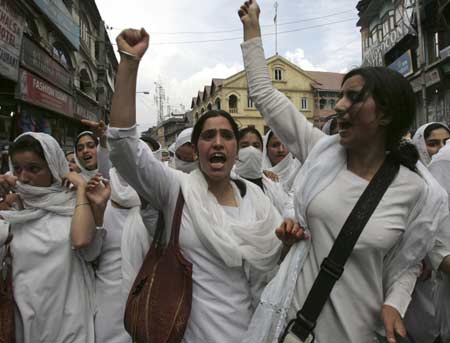The daughter of one of Kashmir’s most prominent politicians has pleaded with the international community to act over an unprecedented clampdown on millions of people in the territory, warning that Kashmiris are being “caged like animals” and treated as “cannon fodder”.
Speaking to the Guardian while under house arrest, Iltija Mufti, the daughter of the former chief minister Mehbooba Mufti, said as many as 25 armed security personnel had surrounded her house last week. All entrances to the house have been locked, she said, defying a communications ban by the Indian government.
Mufti said no legal basis had been provided for her detention but she had been told her previous comments to the media, criticising India’s actions in Kashmir, had angered officials. She said she had been denied a lawyer and prevented from seeing visitors.
Her mother was placed under house arrest hours before the Indian government made a dramatic announcement on 5 August that it would withdraw Kashmir’s special status. She is understood to have been taken to a makeshift jail. About 500 people have reportedly been detained, ostensibly to prevent unrest.
Mufti said she feared that speaking to the media might result in her being jailed, but she had chosen to call for action before a closed-door UN security council meeting on the matter, expected to be held on Friday.
“I’ve quite clearly been told: first of all we make sure you don’t get your voice out, and you’re not heard, and if you do, be ready to suffer the consequences,” said Mufti, who managed to speak to the Guardian from her home. “Those consequences will be that you will be detained indefinitely and that I won’t have the right or access to even a lawyer.
I feel really scared for my life. I don’t think I am safe any more because I don’t trust this government. The way they have gone after even elected representatives is quite frightening.”
Her mother had argued in favour of a shared future with India – a view many in Kashmir believe has now been completely discredited.
Delhi’s decision strips the disputed state of Kashmir and Jammu of any elements of autonomy, removing its constitution and flag, and scrapping laws that prevented outsiders from buying land. The state will also be split in two. Many Kashmiris believe the changes pose an existential threat, and the demography of the country’s only Muslim-majority state will be altered.
Quick guide
Kashmir
Show
On Friday, the Jammu and Kashmir chief secretary, BVR Subrahmanyam, said “a few preventive detentions” of individuals had been made, “in accordance with the provisions of the law”.
He also said restrictions on landlines would be eased over the coming days. It is not clear when mobile phone services will be restored.
Millions of people across Kashmir have been under an unprecedented communications blackout since 5 August, with no internet, mobile or landline services, as part of measures described by a UN official as draconian.
There are fears for the most vulnerable residents in Kashmir. Mufti said people in the state were being treated as “cannon fodder”, did not have access to medical supplies and were probably running out of food.
“Let them go, let them free,” she said.
Kashmir is a volcano waiting to erupt, she said. “There’s palpable anger … the day this curfew is lifted I feel like all that anger is going to spill out on to the streets of Kashmir. And it’s not going to be good.
“People are so angry. They are fuming at the way they were stripped of their rights … and to add insult to injury you have tied them up like they are animals. But they are not animals; they are humans beings,” she said.
The communication blocks had debilitated an entire population, she added. “Not only have they massacred our state and cleaved it into two parts, they have also stripped us of our dignity.”
Subrahmanyam said that 12 of the 22 districts of the state were functioning normally with some limited night-time restrictions in five of these. However, communication blocks mean it is not possible to independently verify this.
He added that restrictions would be lifted in the next few days, with some schools opened after the weekend. Restrictions on movement would be removed on an area-by-area basis, he said.
On Thursday, Mufti wrote to India’s home minister, Amit Shah, asking under what legal grounds she had been detained. “Is it a crime to articulate the pain, torment and indignity we’ve been subjected to?” she wrote.
Outside her home, Mufti said, a military van waits at the front gate. “Every time that I step out into the garden for fresh air there is a man who intercepts them on a walkie talkie and lets them know that I’ve stepped out,” she said. Three to four female officers, who she believes are there to grab her if she attempts to run, were also present.
It is more than 11 days since her mother was arrested.
“I miss her terribly and there are times when I dream of her and imagine us in happier times.” India can no longer claim to be the world’s largest democracy, she said: “Not after what Kashmiris have had to endure in the past two weeks.”








